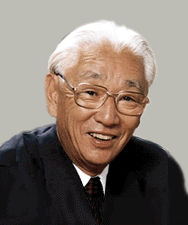Akio
Morita 1921-1999 Akio Morita founded the Tokyo Telecommunications Engineering Corp. with partner Masaru Ibuka in 1946. In 1958, seeking to give the company a name that was clever and catchy, the pair chose Sony, combining "sonus," the Latin root for sound, and "Sonny," which typified American friendliness. Morita's passion was innovation. Sony employees were encouraged to develop new designs and products, and the company held contests to help motivate creativity in product design. Morita's strategies helped steer Japanese industries toward creation of new technologies instead of merely making cheap knock-offs of items developed in the West. In 1963, Morita moved his entire family to the United States as part of a strategy to take his company worldwide. He believed that living in America would give him a better understanding of the marketplace, local regulations, and consumers' wants and needs. Sony is a worldwide leader in technological development. Among its innovations is the Walkman, the personal radio or cassette player with headphones. Morita himself came up with the idea of a very portable, high-quality cassette player that allowed the listener to do other things while enjoying music. The Sony Corp. marketed the first transistor television in 1960. In 1966 came a demonstration of the first color home videotape recorder. The 3.5-inch floppy disk was a Sony invention in 1989. Even Sony's failures are successes: Sony's Beta videotape format fell out of favor with the consumer market, but the Betacam system is an industry standard in television broadcasting. Not content to be a dominator in electronics, the Sony Corp. purchased CBS Records in January 1988 to form Sony Music Entertainment and acquired Columbia Pictures in 1989 to form Sony Pictures Entertainment. The Sony Corp. employs 173,000 people worldwide, 25,299 of those in the United States. |


